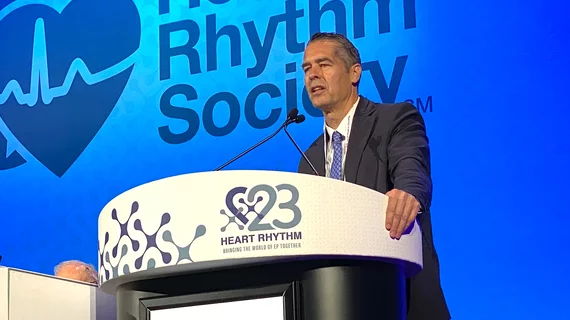HRS 2024: Late-breaking clinical trials will highlight key trends in electrophysiology
A total of 21 late-breaking science presentations are scheduled for Heart Rhythm 2024, the annual meeting of the Heart Rhythm Society (HRS). The meeting will take place May 16-19 in Boston.
HRS said this year’s meeting received the highest number of late-breaking abstract submissions in the 45-year history of the conference.
“This year, we are excited to see a 23% increase in scientific abstract submissions since our 2020 annual meeting, bringing us closer to pre-pandemic numbers,” HRS President Jodie L. Hurwitz, MD, said in a statement. “The Heart Rhythm Society will bring together heart rhythm care professionals from more than 80 countries once again to share the latest groundbreaking science, technologies, and life-saving therapies so they can return home with a reinvigorated passion for arrhythmia patient care.”
The society expects approximately 8,400 attendees this year in addition to more than 200 sessions and more than 100 vendors of the exhibit floor.
Find more information on Heart Rhythm 2024.
Late Breaking Clinical Trials and Science – CIEDs
Friday, May 17 at 11:30 a.m. ET, Ballroom East West
• LEADR in Defibrillation: Global pivotal trial results of a novel, small-diameter defibrillation lead designed for reliability. Presented by George Crossley, III.
• APPRAISE ATP: Assessment of primary prevention patients receiving an ICD, systematic evaluation of ATP. Presented by Claudio Schuger.
• TECSPAM: Transvenous extraction of conduction system pacing leads, an international multicenter Study. Presented by Pugazhendhi Vijayaraman.
• BARRIER-PROTECT: Impact of iodine impregnated barrier dressings on cardiac implantable device infections. A randomized controlled trial. Presented by Alper Aydin.
Late Breaking Clinical Trials and Science – Ablation
Friday, May 17, 4 p.m. ET, Ballroom East West
• Randomized Controlled Trial of a Lattice-Tip Mapping and Ablation System with Radiofrequency and Pulsed Field Energy for Treating Persistent Atrial Fibrillation. Presented by Elad Anter.
• CASA-AF long-term outcomes in long standing persistent atrial fibrillation following catheter or thoracoscopic surgical ablation using continuous monitoring. Three-year follow-up of CASA-AF randomized controlled trial. Presented by Tom Wong.
• FARADISE: Real world data collection in subjects treated with the FARAPULSE Pulsed Field Ablation system. Presented by Lucas Boersma.
• admIRE: Long-term safety and effectiveness after paroxysmal atrial fibrillation pulsed field ablation from the U.S. multicenter study. Presented by Vivek Reddy.
Late Breaking Clinical Trials and Science – Innovation
Saturday, May 18, 9:30 a.m. ET
• TAILORED-AF Randomized Clinical Trial: Tailored cardiac ablation procedure for persistent atrial fibrillation guided by artificial intelligence. Presented by Isabel Deisenhofer.
• One year safety and performance from a clinical study of a dual-chamber leadless pacemaker system. Presented by Reinoud Knops.
• MODULAR ATP Interim Cohort: Tachycardia therapy and endpoint results of the first modular, intra-body, communicating subcutaneous defibrillator-leadless pacemaker system. Presented by Reinoud Knops.
• 1-Year Outcomes of the First-in-Human PULSE-EU Trial: AF ablation using a novel “single-shot” map-and-ablate spherical array pulsed field ablation catheter. Presented by Vivek Reddy.
Late Breaking Clinical Trials and Science – Ablation
Saturday, May 18, 2 p.m. ET
• PREDIMAR Trial: Mediterranean diet enriched with extra virgin olive oil reduced risk of tachyarrhythmia recurrence after atrial fibrillation ablation. Presented by Maria Barrio-Lopez.
• Sub-analysis of the ADVENT Trial: Impact of pulsed field vs. thermal ablation on one-year atrial arrhythmia burden. Presented by Vivek Reddy.
• REAL-AF Registry: Short- and long-term clinical outcomes of radiofrequency catheter ablation in paroxysmal atrial fibrillation. Presented by Paul Zei.
• MANIFEST-PF Registry Sub-analysis: Safety and effectiveness of pulsed field ablation for atrial fibrillation in patients with heart failure. Presented by Mohit Turagam.
Late Breaking Clinical Trails and Science – CIEDs
Sunday, May 19, 9:30 a.m. ET
• LIVE-LQTS: Impact of vigorous exercise in the long QT syndrome by genotype, age, and sex. Data from the Lifestyle and Exercise in Long QT Syndrome Registry. Presented by Rachel Lampert.
• BIO-CONDUCT Study: Left bundle branch area pacing using a stylet driven, retractable helix lead results from a prospective, multicenter trial. Presented by Larry Chinitz.
• Early cardiac resynchronization therapy for patients with moderately reduced ejection fraction and left bundle branch block. Presented by Yong-Mei Cha.
• ARTESiA: Efficacy and safety of apixaban vs. aspirin according to CHA2DS2-VASc score in patients with subclinical atrial fibrillation. Presented by Jeffrey Healey.
• NOAH-AFNET 6 Trial: Outcomes with and without oral anticoagulation in patients with prior stroke and device-detected atrial fibrillation. Presented by Paulus Kirchhof.

